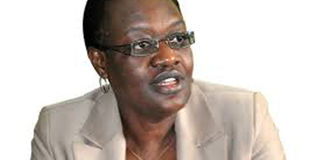War on corruption should be real, not smokescreen

The IGG, Ms Irene Mulyagonja, said corrupt government officials were hiding behind the Head of State through their connections to him. FILE PHOTO
What you need to know:
- The issue: Corruption
- Our view: The fight against graft in a country whose moral fabric has been eaten up by impunity and free-will abuse of public funds across the Judiciary, police and public offices, is always welcome.
President Museveni yesterday issued a raft of measures, including a team led by Lt Col Edith Nakalema, in the fight against corruption and perhaps to tick off one of the key performance indicators in Kisanja Hakuna Mchezo (term of no jokes) as he promised in May 2016.
Corruption, which is widely seen as the abuse of entrusted power for private gain, whether grand, petty or political, affects all sectors of the economy; in education, health, justice, and agriculture, among others.
The fight against graft in a country whose moral fabric has been eaten up by impunity and free-will abuse of public funds across the Judiciary, police and public offices, is always welcome. The statistics, for instance, are an eyesore.
In its February 21, corruption perception index report, Transparency International, a global anti-corruption organisation, ranked Uganda 151 of the 180 countries surveyed in the fight against corruption. This means Uganda is the 25th most corrupt country among those surveyed globally. Not nice at all!
According to a 2017 Sauti za Wananchi report by Twaweza, a non-governmental organisation, 60 per cent of citizens who had contact with the police in the last year, say a bribe was either directly requested (47 per cent) or expected (13 per cent) in order to get assistance or speed up services. Of the people talked to, half (50 per cent) of them said they had ever paid a bribe.
However, the new pronouncements made at Kololo Independence Grounds in Kampala yesterday should not excite us yet. And we should use this time to ask ourselves; what happened to bodies such as the Inspectorate of Government tasked to fight corruption?
President Museveni in June this year questioned the effectiveness of the IGG in the fight against graft. And in her volley, the IGG, Ms Irene Mulyagonja, said corrupt government officials were hiding behind the Head of State through their connections to him.
Yet according to the 2017 bi-annual Inspectorate of Government Performance Report to Parliament, the major challenges the IGG faces in the fight against corruption include shortage of judges to fight corruption and the absence of a leadership code tribunal, among others.
Before yesterday, the laws under the Inspectorate of Government Act 1988, The Anti-Corruption Act 2009, Leadership Code Act 2002, and Public Finance Management Act 2015 mandated those bodies to fight graft.
We then ask, with all those bodies in place yet corruption has only become endemic, how will the new ‘desk’ succeed where the rest failed?
The presidency should not just end at creating desks. If it is true, as the IGG said, that the corrupt hide behind the presidency, then Lt Col Nakalema has her work cut out.




